Critical Evaluation of Recovery Oriented Mental Health Nursing
VerifiedAdded on 2023/04/23
|6
|1645
|321
Essay
AI Summary
This essay critically evaluates recovery-oriented mental health nursing practices in reducing public and self-stigma, prejudice, and discrimination towards individuals diagnosed with mental illness. It introduces the concept of recovery-oriented practice, emphasizing its focus on patient empowerment and social inclusion, contrasting it with traditional outcome-based approaches. The essay explores the 10 competencies and principles of recovery-oriented practice, highlighting the importance of patient autonomy, individuality, and integrity. It examines the impact of social stigma on mental health care and the role of nursing professionals in implementing recovery-oriented strategies. The essay discusses relevant guidelines, standards, and models of recovery, including the Mind's model, and concludes by emphasizing the need for continued assessment and patient-centered care to successfully implement recovery-oriented interventions and overcome barriers to effective treatment.
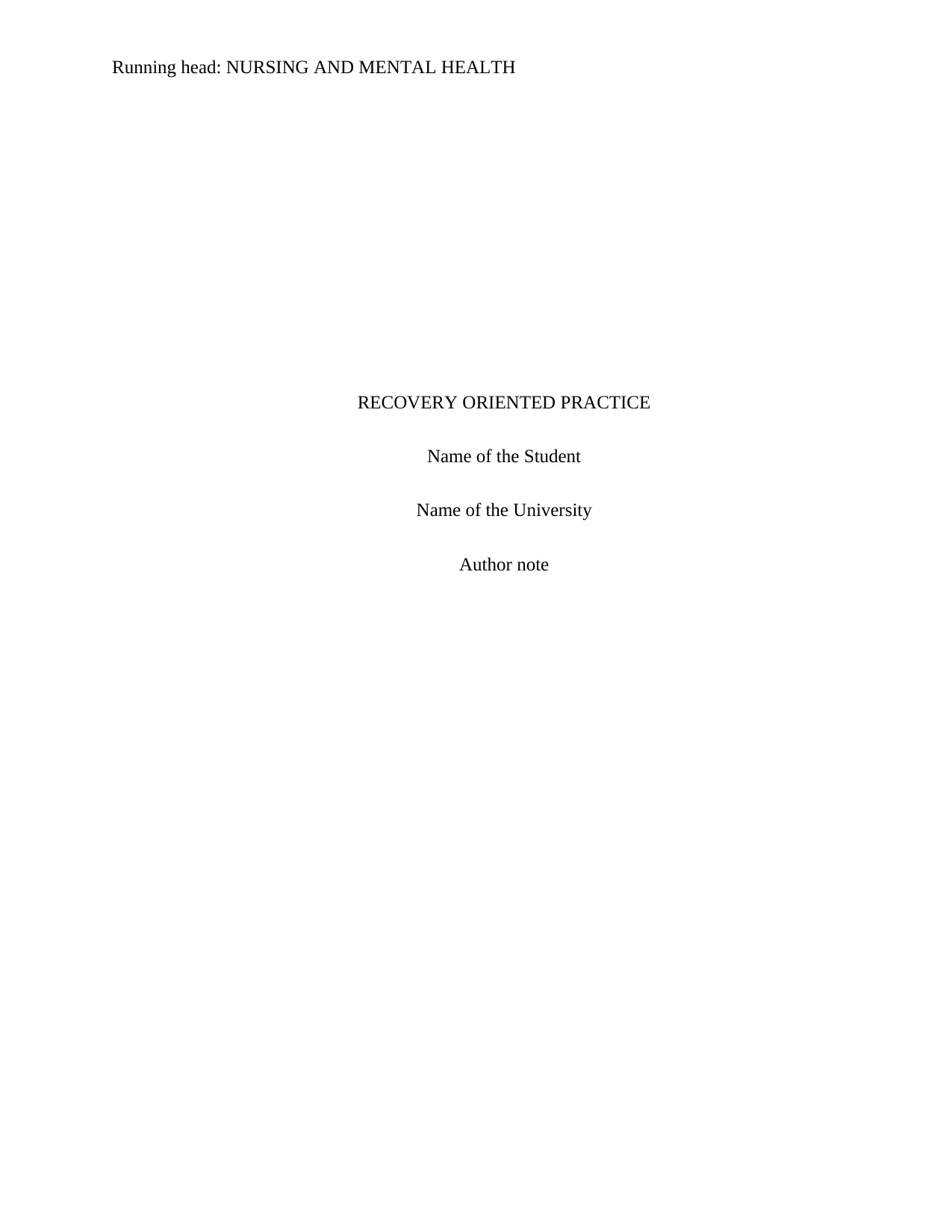
Running head: NURSING AND MENTAL HEALTH
RECOVERY ORIENTED PRACTICE
Name of the Student
Name of the University
Author note
RECOVERY ORIENTED PRACTICE
Name of the Student
Name of the University
Author note
Paraphrase This Document
Need a fresh take? Get an instant paraphrase of this document with our AI Paraphraser
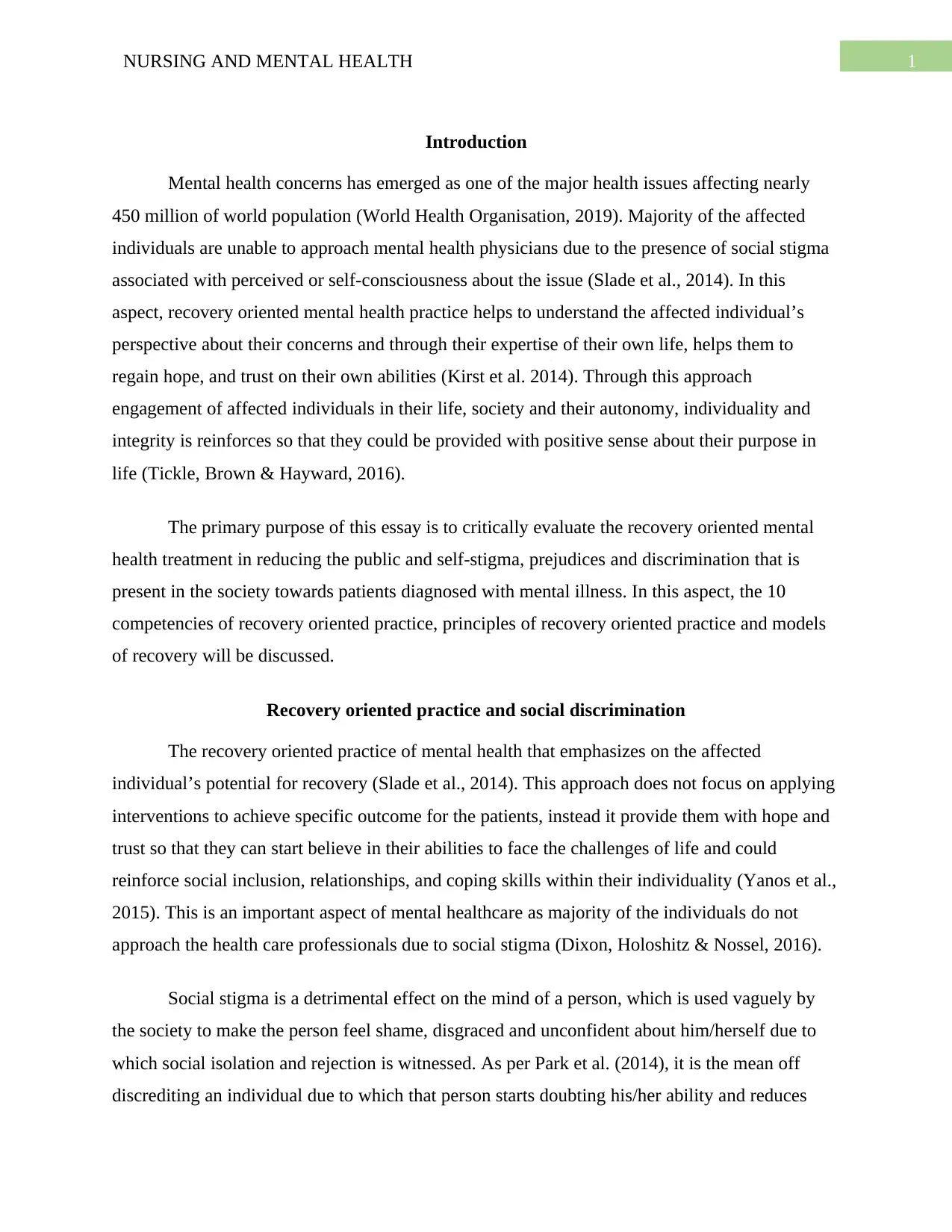
1NURSING AND MENTAL HEALTH
Introduction
Mental health concerns has emerged as one of the major health issues affecting nearly
450 million of world population (World Health Organisation, 2019). Majority of the affected
individuals are unable to approach mental health physicians due to the presence of social stigma
associated with perceived or self-consciousness about the issue (Slade et al., 2014). In this
aspect, recovery oriented mental health practice helps to understand the affected individual’s
perspective about their concerns and through their expertise of their own life, helps them to
regain hope, and trust on their own abilities (Kirst et al. 2014). Through this approach
engagement of affected individuals in their life, society and their autonomy, individuality and
integrity is reinforces so that they could be provided with positive sense about their purpose in
life (Tickle, Brown & Hayward, 2016).
The primary purpose of this essay is to critically evaluate the recovery oriented mental
health treatment in reducing the public and self-stigma, prejudices and discrimination that is
present in the society towards patients diagnosed with mental illness. In this aspect, the 10
competencies of recovery oriented practice, principles of recovery oriented practice and models
of recovery will be discussed.
Recovery oriented practice and social discrimination
The recovery oriented practice of mental health that emphasizes on the affected
individual’s potential for recovery (Slade et al., 2014). This approach does not focus on applying
interventions to achieve specific outcome for the patients, instead it provide them with hope and
trust so that they can start believe in their abilities to face the challenges of life and could
reinforce social inclusion, relationships, and coping skills within their individuality (Yanos et al.,
2015). This is an important aspect of mental healthcare as majority of the individuals do not
approach the health care professionals due to social stigma (Dixon, Holoshitz & Nossel, 2016).
Social stigma is a detrimental effect on the mind of a person, which is used vaguely by
the society to make the person feel shame, disgraced and unconfident about him/herself due to
which social isolation and rejection is witnessed. As per Park et al. (2014), it is the mean off
discrediting an individual due to which that person starts doubting his/her ability and reduces
Introduction
Mental health concerns has emerged as one of the major health issues affecting nearly
450 million of world population (World Health Organisation, 2019). Majority of the affected
individuals are unable to approach mental health physicians due to the presence of social stigma
associated with perceived or self-consciousness about the issue (Slade et al., 2014). In this
aspect, recovery oriented mental health practice helps to understand the affected individual’s
perspective about their concerns and through their expertise of their own life, helps them to
regain hope, and trust on their own abilities (Kirst et al. 2014). Through this approach
engagement of affected individuals in their life, society and their autonomy, individuality and
integrity is reinforces so that they could be provided with positive sense about their purpose in
life (Tickle, Brown & Hayward, 2016).
The primary purpose of this essay is to critically evaluate the recovery oriented mental
health treatment in reducing the public and self-stigma, prejudices and discrimination that is
present in the society towards patients diagnosed with mental illness. In this aspect, the 10
competencies of recovery oriented practice, principles of recovery oriented practice and models
of recovery will be discussed.
Recovery oriented practice and social discrimination
The recovery oriented practice of mental health that emphasizes on the affected
individual’s potential for recovery (Slade et al., 2014). This approach does not focus on applying
interventions to achieve specific outcome for the patients, instead it provide them with hope and
trust so that they can start believe in their abilities to face the challenges of life and could
reinforce social inclusion, relationships, and coping skills within their individuality (Yanos et al.,
2015). This is an important aspect of mental healthcare as majority of the individuals do not
approach the health care professionals due to social stigma (Dixon, Holoshitz & Nossel, 2016).
Social stigma is a detrimental effect on the mind of a person, which is used vaguely by
the society to make the person feel shame, disgraced and unconfident about him/herself due to
which social isolation and rejection is witnessed. As per Park et al. (2014), it is the mean off
discrediting an individual due to which that person starts doubting his/her ability and reduces
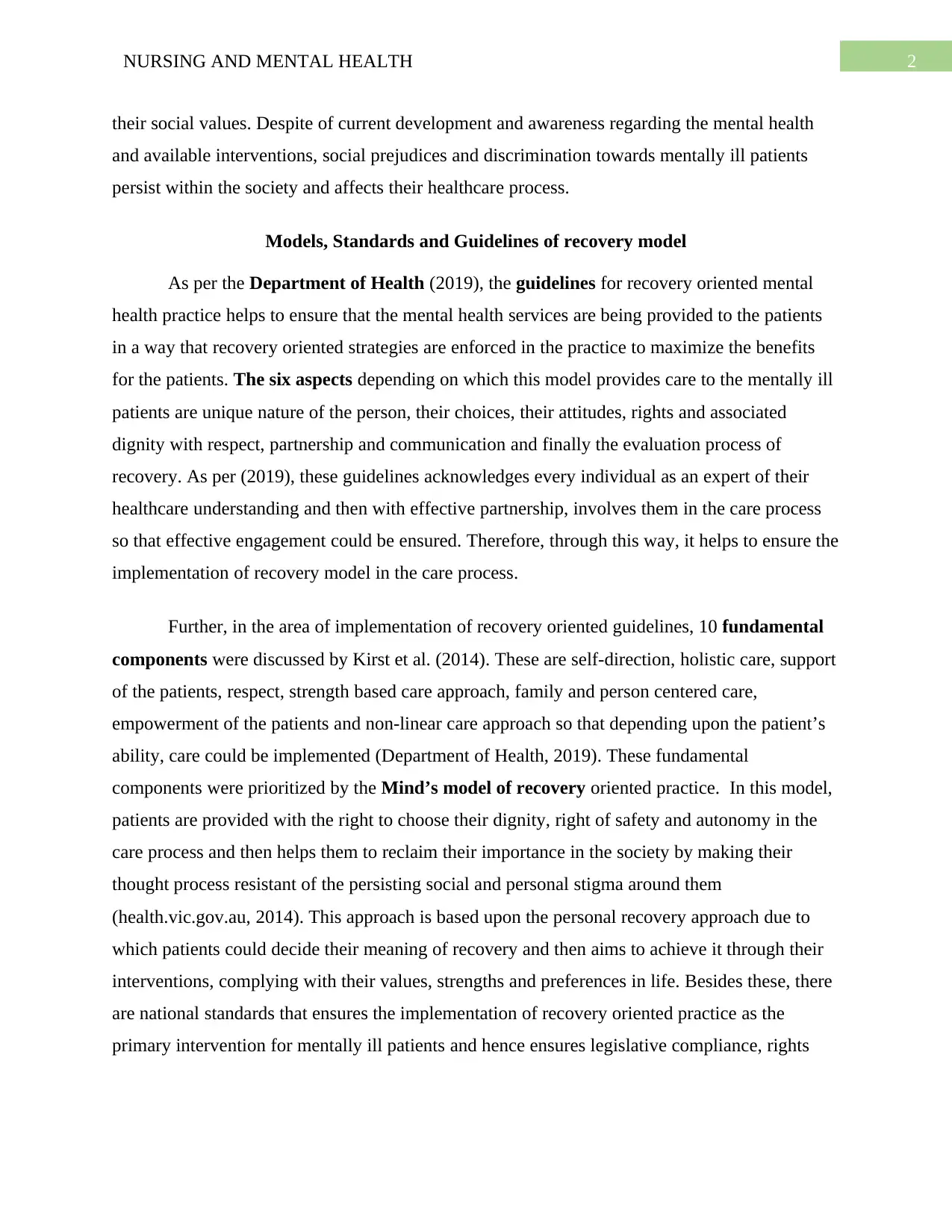
2NURSING AND MENTAL HEALTH
their social values. Despite of current development and awareness regarding the mental health
and available interventions, social prejudices and discrimination towards mentally ill patients
persist within the society and affects their healthcare process.
Models, Standards and Guidelines of recovery model
As per the Department of Health (2019), the guidelines for recovery oriented mental
health practice helps to ensure that the mental health services are being provided to the patients
in a way that recovery oriented strategies are enforced in the practice to maximize the benefits
for the patients. The six aspects depending on which this model provides care to the mentally ill
patients are unique nature of the person, their choices, their attitudes, rights and associated
dignity with respect, partnership and communication and finally the evaluation process of
recovery. As per (2019), these guidelines acknowledges every individual as an expert of their
healthcare understanding and then with effective partnership, involves them in the care process
so that effective engagement could be ensured. Therefore, through this way, it helps to ensure the
implementation of recovery model in the care process.
Further, in the area of implementation of recovery oriented guidelines, 10 fundamental
components were discussed by Kirst et al. (2014). These are self-direction, holistic care, support
of the patients, respect, strength based care approach, family and person centered care,
empowerment of the patients and non-linear care approach so that depending upon the patient’s
ability, care could be implemented (Department of Health, 2019). These fundamental
components were prioritized by the Mind’s model of recovery oriented practice. In this model,
patients are provided with the right to choose their dignity, right of safety and autonomy in the
care process and then helps them to reclaim their importance in the society by making their
thought process resistant of the persisting social and personal stigma around them
(health.vic.gov.au, 2014). This approach is based upon the personal recovery approach due to
which patients could decide their meaning of recovery and then aims to achieve it through their
interventions, complying with their values, strengths and preferences in life. Besides these, there
are national standards that ensures the implementation of recovery oriented practice as the
primary intervention for mentally ill patients and hence ensures legislative compliance, rights
their social values. Despite of current development and awareness regarding the mental health
and available interventions, social prejudices and discrimination towards mentally ill patients
persist within the society and affects their healthcare process.
Models, Standards and Guidelines of recovery model
As per the Department of Health (2019), the guidelines for recovery oriented mental
health practice helps to ensure that the mental health services are being provided to the patients
in a way that recovery oriented strategies are enforced in the practice to maximize the benefits
for the patients. The six aspects depending on which this model provides care to the mentally ill
patients are unique nature of the person, their choices, their attitudes, rights and associated
dignity with respect, partnership and communication and finally the evaluation process of
recovery. As per (2019), these guidelines acknowledges every individual as an expert of their
healthcare understanding and then with effective partnership, involves them in the care process
so that effective engagement could be ensured. Therefore, through this way, it helps to ensure the
implementation of recovery model in the care process.
Further, in the area of implementation of recovery oriented guidelines, 10 fundamental
components were discussed by Kirst et al. (2014). These are self-direction, holistic care, support
of the patients, respect, strength based care approach, family and person centered care,
empowerment of the patients and non-linear care approach so that depending upon the patient’s
ability, care could be implemented (Department of Health, 2019). These fundamental
components were prioritized by the Mind’s model of recovery oriented practice. In this model,
patients are provided with the right to choose their dignity, right of safety and autonomy in the
care process and then helps them to reclaim their importance in the society by making their
thought process resistant of the persisting social and personal stigma around them
(health.vic.gov.au, 2014). This approach is based upon the personal recovery approach due to
which patients could decide their meaning of recovery and then aims to achieve it through their
interventions, complying with their values, strengths and preferences in life. Besides these, there
are national standards that ensures the implementation of recovery oriented practice as the
primary intervention for mentally ill patients and hence ensures legislative compliance, rights
⊘ This is a preview!⊘
Do you want full access?
Subscribe today to unlock all pages.

Trusted by 1+ million students worldwide
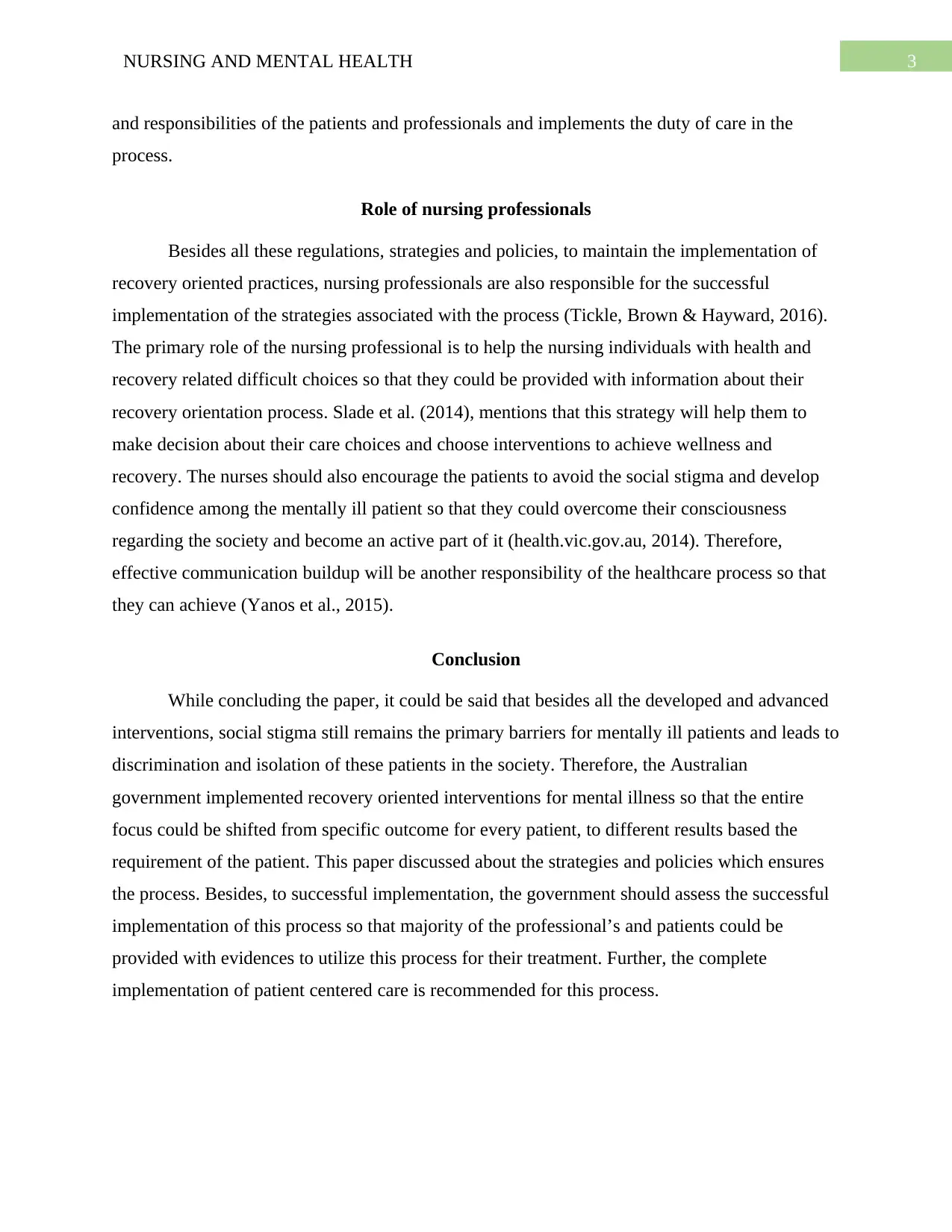
3NURSING AND MENTAL HEALTH
and responsibilities of the patients and professionals and implements the duty of care in the
process.
Role of nursing professionals
Besides all these regulations, strategies and policies, to maintain the implementation of
recovery oriented practices, nursing professionals are also responsible for the successful
implementation of the strategies associated with the process (Tickle, Brown & Hayward, 2016).
The primary role of the nursing professional is to help the nursing individuals with health and
recovery related difficult choices so that they could be provided with information about their
recovery orientation process. Slade et al. (2014), mentions that this strategy will help them to
make decision about their care choices and choose interventions to achieve wellness and
recovery. The nurses should also encourage the patients to avoid the social stigma and develop
confidence among the mentally ill patient so that they could overcome their consciousness
regarding the society and become an active part of it (health.vic.gov.au, 2014). Therefore,
effective communication buildup will be another responsibility of the healthcare process so that
they can achieve (Yanos et al., 2015).
Conclusion
While concluding the paper, it could be said that besides all the developed and advanced
interventions, social stigma still remains the primary barriers for mentally ill patients and leads to
discrimination and isolation of these patients in the society. Therefore, the Australian
government implemented recovery oriented interventions for mental illness so that the entire
focus could be shifted from specific outcome for every patient, to different results based the
requirement of the patient. This paper discussed about the strategies and policies which ensures
the process. Besides, to successful implementation, the government should assess the successful
implementation of this process so that majority of the professional’s and patients could be
provided with evidences to utilize this process for their treatment. Further, the complete
implementation of patient centered care is recommended for this process.
and responsibilities of the patients and professionals and implements the duty of care in the
process.
Role of nursing professionals
Besides all these regulations, strategies and policies, to maintain the implementation of
recovery oriented practices, nursing professionals are also responsible for the successful
implementation of the strategies associated with the process (Tickle, Brown & Hayward, 2016).
The primary role of the nursing professional is to help the nursing individuals with health and
recovery related difficult choices so that they could be provided with information about their
recovery orientation process. Slade et al. (2014), mentions that this strategy will help them to
make decision about their care choices and choose interventions to achieve wellness and
recovery. The nurses should also encourage the patients to avoid the social stigma and develop
confidence among the mentally ill patient so that they could overcome their consciousness
regarding the society and become an active part of it (health.vic.gov.au, 2014). Therefore,
effective communication buildup will be another responsibility of the healthcare process so that
they can achieve (Yanos et al., 2015).
Conclusion
While concluding the paper, it could be said that besides all the developed and advanced
interventions, social stigma still remains the primary barriers for mentally ill patients and leads to
discrimination and isolation of these patients in the society. Therefore, the Australian
government implemented recovery oriented interventions for mental illness so that the entire
focus could be shifted from specific outcome for every patient, to different results based the
requirement of the patient. This paper discussed about the strategies and policies which ensures
the process. Besides, to successful implementation, the government should assess the successful
implementation of this process so that majority of the professional’s and patients could be
provided with evidences to utilize this process for their treatment. Further, the complete
implementation of patient centered care is recommended for this process.
Paraphrase This Document
Need a fresh take? Get an instant paraphrase of this document with our AI Paraphraser
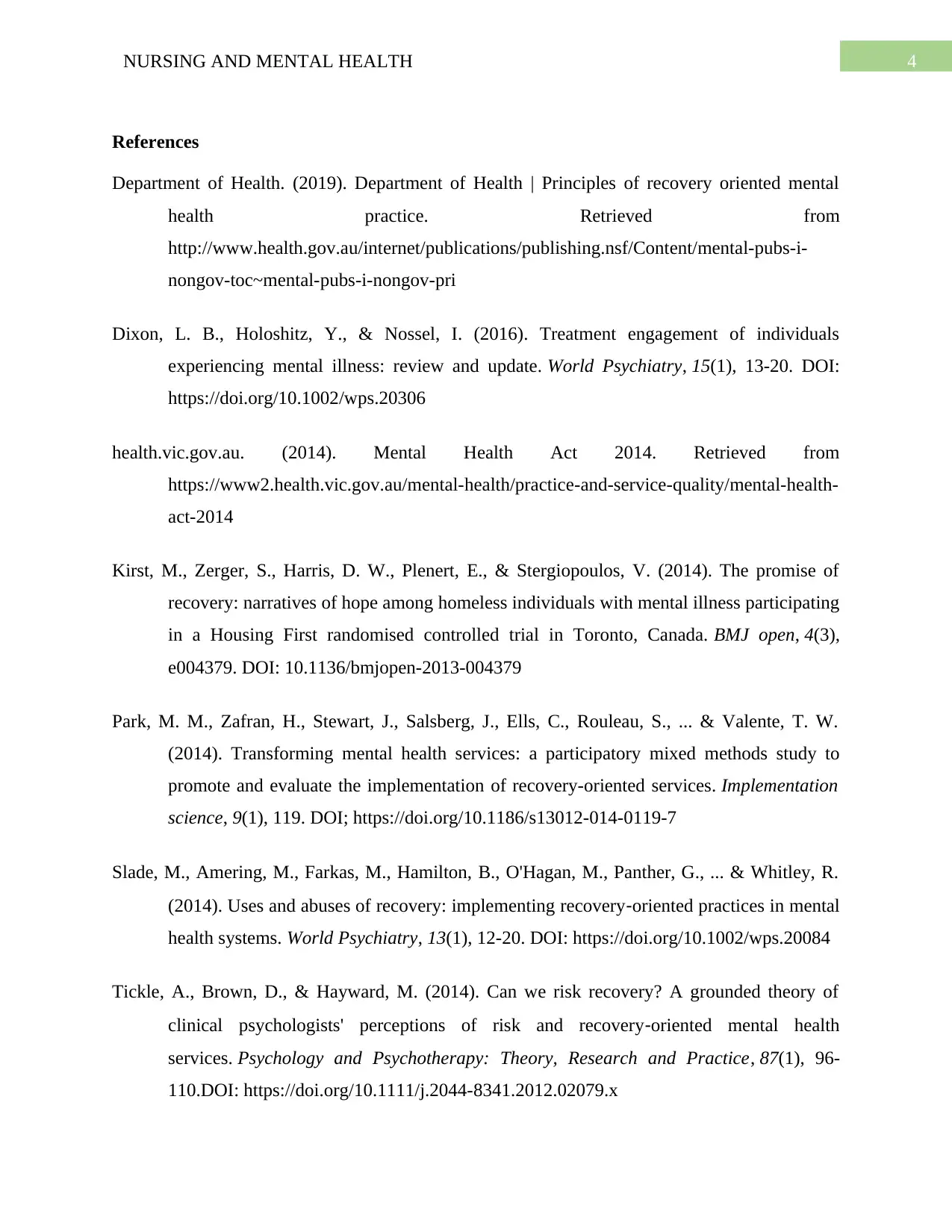
4NURSING AND MENTAL HEALTH
References
Department of Health. (2019). Department of Health | Principles of recovery oriented mental
health practice. Retrieved from
http://www.health.gov.au/internet/publications/publishing.nsf/Content/mental-pubs-i-
nongov-toc~mental-pubs-i-nongov-pri
Dixon, L. B., Holoshitz, Y., & Nossel, I. (2016). Treatment engagement of individuals
experiencing mental illness: review and update. World Psychiatry, 15(1), 13-20. DOI:
https://doi.org/10.1002/wps.20306
health.vic.gov.au. (2014). Mental Health Act 2014. Retrieved from
https://www2.health.vic.gov.au/mental-health/practice-and-service-quality/mental-health-
act-2014
Kirst, M., Zerger, S., Harris, D. W., Plenert, E., & Stergiopoulos, V. (2014). The promise of
recovery: narratives of hope among homeless individuals with mental illness participating
in a Housing First randomised controlled trial in Toronto, Canada. BMJ open, 4(3),
e004379. DOI: 10.1136/bmjopen-2013-004379
Park, M. M., Zafran, H., Stewart, J., Salsberg, J., Ells, C., Rouleau, S., ... & Valente, T. W.
(2014). Transforming mental health services: a participatory mixed methods study to
promote and evaluate the implementation of recovery-oriented services. Implementation
science, 9(1), 119. DOI; https://doi.org/10.1186/s13012-014-0119-7
Slade, M., Amering, M., Farkas, M., Hamilton, B., O'Hagan, M., Panther, G., ... & Whitley, R.
(2014). Uses and abuses of recovery: implementing recovery‐oriented practices in mental
health systems. World Psychiatry, 13(1), 12-20. DOI: https://doi.org/10.1002/wps.20084
Tickle, A., Brown, D., & Hayward, M. (2014). Can we risk recovery? A grounded theory of
clinical psychologists' perceptions of risk and recovery‐oriented mental health
services. Psychology and Psychotherapy: Theory, Research and Practice, 87(1), 96-
110.DOI: https://doi.org/10.1111/j.2044-8341.2012.02079.x
References
Department of Health. (2019). Department of Health | Principles of recovery oriented mental
health practice. Retrieved from
http://www.health.gov.au/internet/publications/publishing.nsf/Content/mental-pubs-i-
nongov-toc~mental-pubs-i-nongov-pri
Dixon, L. B., Holoshitz, Y., & Nossel, I. (2016). Treatment engagement of individuals
experiencing mental illness: review and update. World Psychiatry, 15(1), 13-20. DOI:
https://doi.org/10.1002/wps.20306
health.vic.gov.au. (2014). Mental Health Act 2014. Retrieved from
https://www2.health.vic.gov.au/mental-health/practice-and-service-quality/mental-health-
act-2014
Kirst, M., Zerger, S., Harris, D. W., Plenert, E., & Stergiopoulos, V. (2014). The promise of
recovery: narratives of hope among homeless individuals with mental illness participating
in a Housing First randomised controlled trial in Toronto, Canada. BMJ open, 4(3),
e004379. DOI: 10.1136/bmjopen-2013-004379
Park, M. M., Zafran, H., Stewart, J., Salsberg, J., Ells, C., Rouleau, S., ... & Valente, T. W.
(2014). Transforming mental health services: a participatory mixed methods study to
promote and evaluate the implementation of recovery-oriented services. Implementation
science, 9(1), 119. DOI; https://doi.org/10.1186/s13012-014-0119-7
Slade, M., Amering, M., Farkas, M., Hamilton, B., O'Hagan, M., Panther, G., ... & Whitley, R.
(2014). Uses and abuses of recovery: implementing recovery‐oriented practices in mental
health systems. World Psychiatry, 13(1), 12-20. DOI: https://doi.org/10.1002/wps.20084
Tickle, A., Brown, D., & Hayward, M. (2014). Can we risk recovery? A grounded theory of
clinical psychologists' perceptions of risk and recovery‐oriented mental health
services. Psychology and Psychotherapy: Theory, Research and Practice, 87(1), 96-
110.DOI: https://doi.org/10.1111/j.2044-8341.2012.02079.x
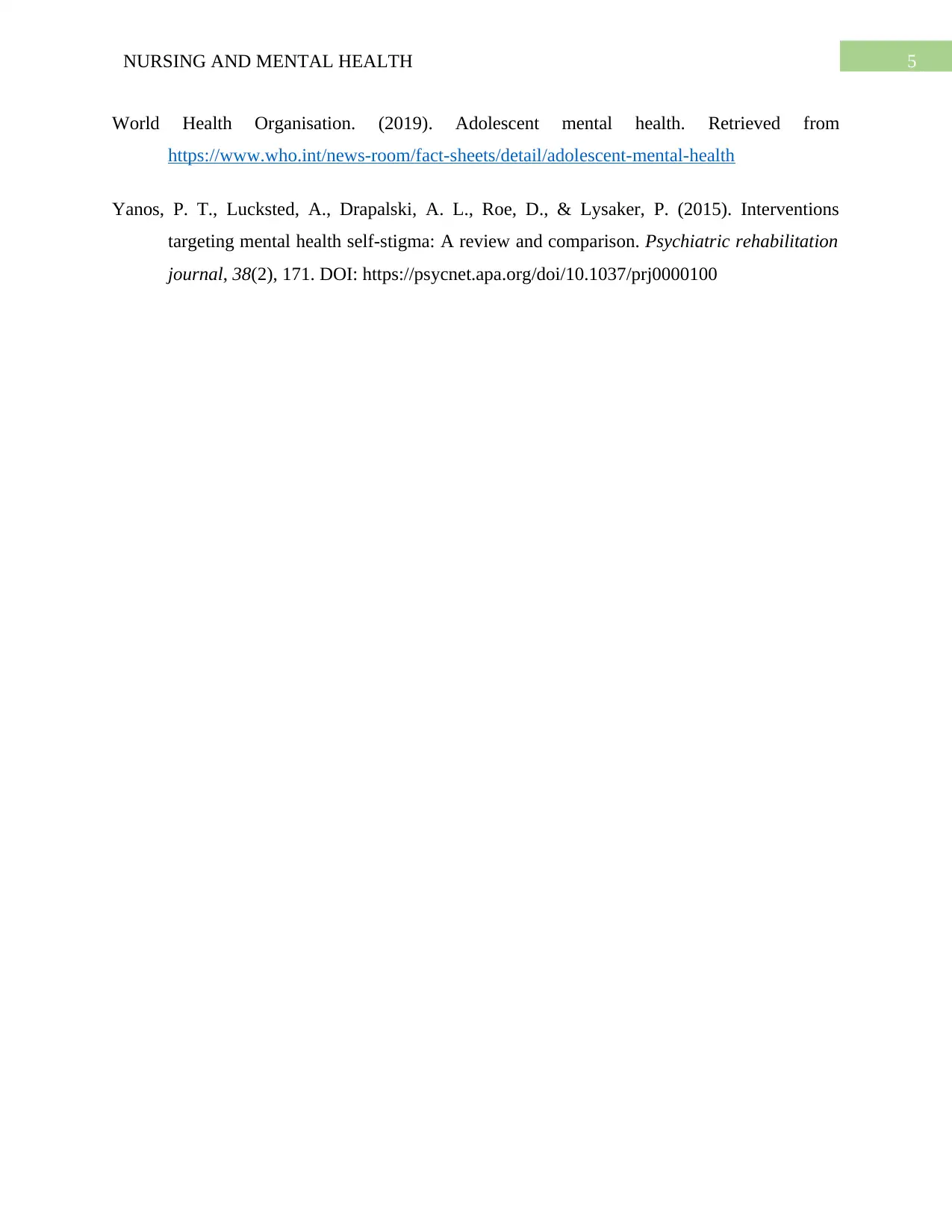
5NURSING AND MENTAL HEALTH
World Health Organisation. (2019). Adolescent mental health. Retrieved from
https://www.who.int/news-room/fact-sheets/detail/adolescent-mental-health
Yanos, P. T., Lucksted, A., Drapalski, A. L., Roe, D., & Lysaker, P. (2015). Interventions
targeting mental health self-stigma: A review and comparison. Psychiatric rehabilitation
journal, 38(2), 171. DOI: https://psycnet.apa.org/doi/10.1037/prj0000100
World Health Organisation. (2019). Adolescent mental health. Retrieved from
https://www.who.int/news-room/fact-sheets/detail/adolescent-mental-health
Yanos, P. T., Lucksted, A., Drapalski, A. L., Roe, D., & Lysaker, P. (2015). Interventions
targeting mental health self-stigma: A review and comparison. Psychiatric rehabilitation
journal, 38(2), 171. DOI: https://psycnet.apa.org/doi/10.1037/prj0000100
⊘ This is a preview!⊘
Do you want full access?
Subscribe today to unlock all pages.

Trusted by 1+ million students worldwide
1 out of 6
Related Documents
Your All-in-One AI-Powered Toolkit for Academic Success.
+13062052269
info@desklib.com
Available 24*7 on WhatsApp / Email
![[object Object]](/_next/static/media/star-bottom.7253800d.svg)
Unlock your academic potential
Copyright © 2020–2026 A2Z Services. All Rights Reserved. Developed and managed by ZUCOL.





